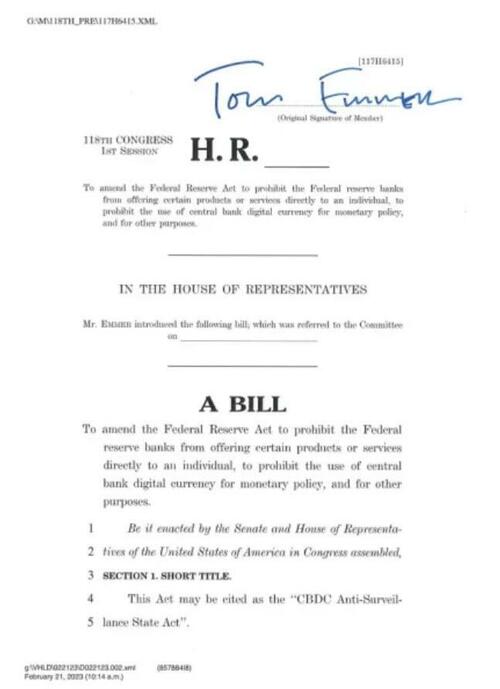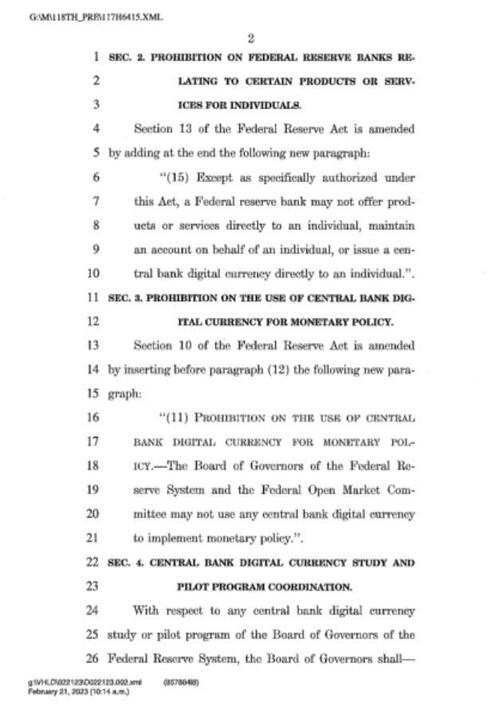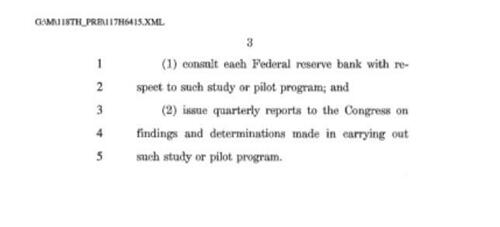Rep. Tom Emmer Says Fed Must Not Create Digital Currency ‘Surveillance State’
Republican House Majority Whip Tom Emmer (R-MN) introduced legislation Wednesday seeking to bar the Federal Reserve from issuing a central bank digital currency (CBDC) directly to individuals, which he says would erode Americans’ rights to financial privacy.
“Any digital version of the dollar must uphold our American values of privacy, individual sovereignty, and free market competitiveness,” Emmer wrote on Twitter Wednesday. “Anything less opens the door to the development of a dangerous surveillance tool.”
Emmer, one of Congress’ most vocal cryptocurrency advocates, previously introduced similar legislation in early 2022. That bill sought to require that any digital currency developed by the Fed be permissionless, to ensure user privacy. The bill was not passed.
Today, I introduced the CBDC Anti-Surveillance State Act to halt efforts of unelected bureaucrats in Washington, DC from stripping Americans of their right to financial privacy. ???? pic.twitter.com/lONbHFZMk7
— Tom Emmer (@GOPMajorityWhip) February 22, 2023
The Fed has previously publicly acknowledged that it is “exploring the potential benefits and risks of CBDCs from a variety of angles,” including research and experimentation. CBDCs are digital versions of national fiat currencies, typically operating on private blockchain networks, meaning they are still closely controlled and regulated by the issuing country.
Numerous governments, including those of Japan, the UK, Turkey, the EU—and, perhaps of greatest interest to the United States, China—are currently barreling ahead with legislative groundwork and trial programs to implement their own digital currencies. A digital version of Nigeria’s currency, the Naira, has been up and running since 2021.
Though there appears to be some bipartisan consensus regarding the need for the United States to keep up with this emergent global trend, multiple American lawmakers including Emmer have voiced concern that the Fed, or the broader U.S. government, could manipulate control over a digital currency to gather sensitive transaction information previously held by private companies, or unavailable due to the proliferation of cash.
The bill introduced by Emmer today, the CBDC Anti-Surveillance State Act, would, in addition to prohibiting the Fed from issuing a CBDC direct to consumers, require the federal agency to consistently report to Congress about the status of its experiments with digital currencies.
Though numerous Federal Reserve offices across the country are currently actively recruiting senior-level developers for digital currency projects, the details of those projects remain under wraps.
Despite cryptocurrency remaining the rare American political issue to have not yet crystalized on partisan lines, Emmer’s bill reportedly has support from nine other Republican legislators, but no Democrats.
Authored by ‘BTCCasey’ via BitcoinMagazine.com,
U.S. Congressman Tom Emmer (R-MN) has introduced a bill that would prohibit the Federal Reserve from issuing a CBDC directly to anyone.
The bill, titled the “CBDC Anti-Surveillance State Act” details that “Except as specifically authorized under this Act, a Federal Reserve bank may not offer products or services directly to an individual, or maintain an account on behalf of an individual, or issue a central bank digital currency directly to an individual.”
It goes on to further detail specifically that “The Board of Governors of the Federal Reserve System and the Federal Open Market Committee may not use any central bank digital currency to implement monetary policy.”
Rep. Emmer explained in his tweet announcing the bill that “Any digital version of the dollar must uphold our American values of privacy, individual sovereignty, and free market competitiveness. Anything less opens the door to the development of a dangerous surveillance tool.”
The bill aims to stem the creation of a CBDC due to the various issues many see as potential results of the creation of an American CBDC. As detailed in various Bitcoin Magazine pieces like “The Dangerous Implications Of Central Bank Digital Currencies,” “Central Bank Digital Currencies: A Technocratic Fallacy” and “The U.S. Central Bank Digital Currency Narrative Is A Fantasy,” the idea of a CBDC not only has moral and ideological opposition to it, but technical limitations present challenges that could make such a thing not possible in the first place.
Several Representatives involved in the bill have also voiced their support. Rep. Barry Loudermilk (R-GA) released a statement saying that he was “Proud to join forces with Rep. Emmer on legislation to keep the Fed from issuing a central bank digital currency. The Fed should be focused on its core mission of stable prices and max employment, not tracking our transactions indefinitely.”
In addition, Rep. Andy Biggs (R-AZ) reiterated this point, explaining that “unelected bureaucrats are driving us to an authoritarian state. That can’t happen.”




